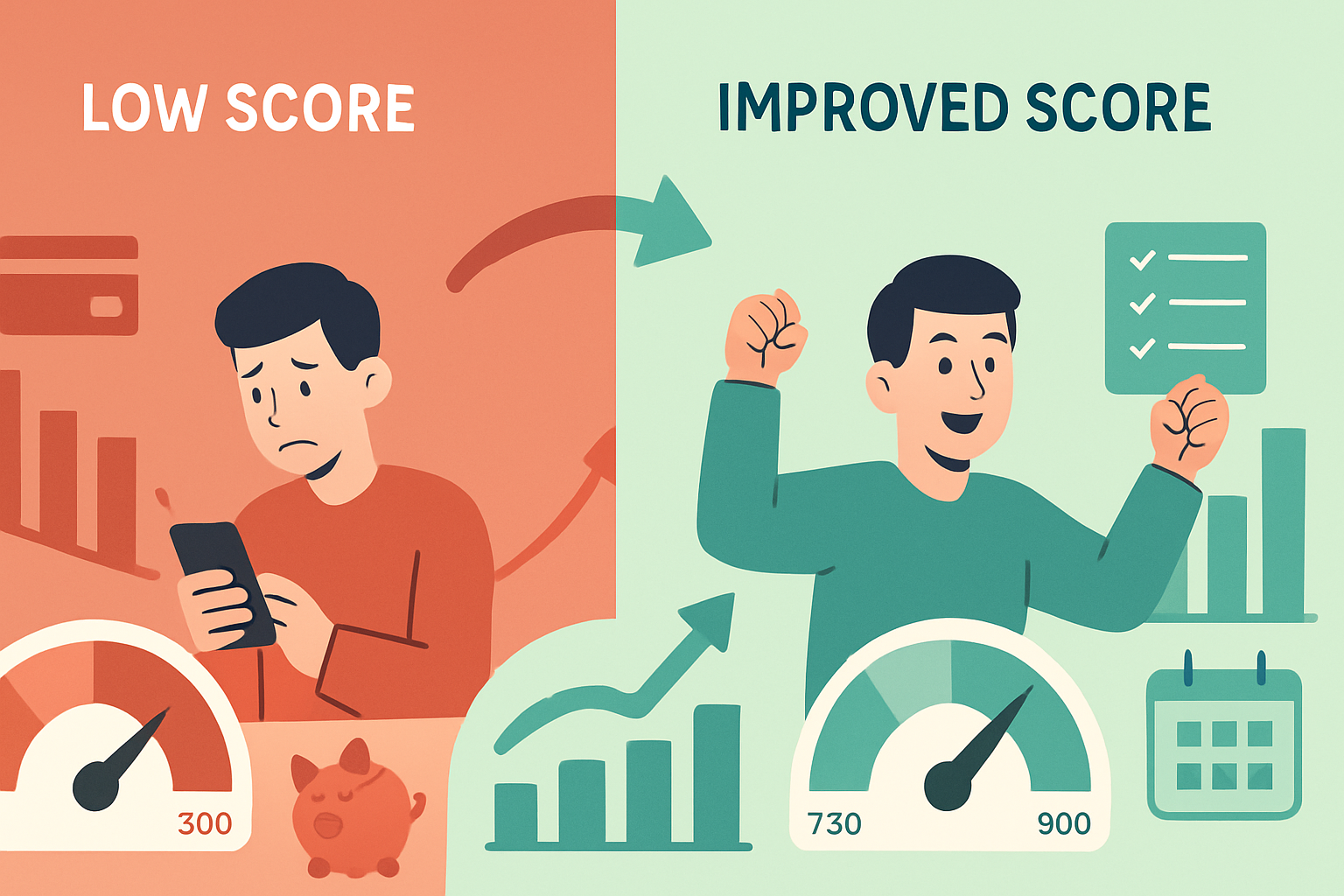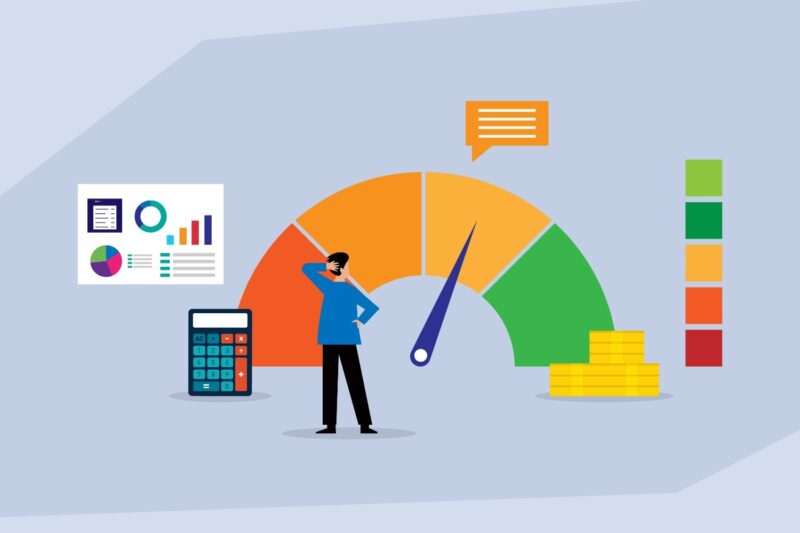The right loan eligibility criteria can help you bounce back stronger than before.A CIBIL score is an extremely important factor in your financial journey. It helps you achieve better financial benefits in your life. If you have ever taken a loan or used a credit card, you already know how important your CIBIL score is. It acts like your financial report card. It reflects your financial behaviour into it, making it easier for the lenders to judge you based on your CIBIL score. Lenders check it before giving you any kind of loan. Just like building trust in life, building a credit score also takes time, patience, and consistency. And it is important to understand the process before applying for a loan or repaying any amount. The type of loan you take, whether it’s a secured personal loan or an unsecured personal loan, plays a role in how fast your score improves. Maintaining a high CIBIL score will help you get better loan options and have access to other benefits.
Here, we will break down how repayment affects your score, what times to expect, and how meeting the
Understanding the basics of CIBIL Score:
Your CIBIL Score tells lenders how trustworthy you are when it comes to repayment of borrowed money.
- 750 and above: A CIBIL score of 750 or above is considered as the highest and an excellent score. A borrower with 750 above score is eligible to get instant approval on loans. It builds trust for the lender to provide the borrower with the best rates and easy approval process.
- 650 – 749: This is considered as decent and a fair number of scores. You might face some small difficulties like higher interest rates. There is always an option to increase your score and avoid these higher charges as well.
- Below 650: This is a sign of a really poor CIBIL score, and this is considered as a bad profile for the lenders as well. There are high chances of lenders rejecting your loan application when your score is this low.
When Does the Cibil Score Start Improving After Repayment?
| Timeline | What happens | Impact on credit score |
| Immediate Reflection (30–45 days) | After you make a repayment, the lender reports the update to CIBIL. It usually takes one to two billing cycles for the change to reflect. | Small but noticeable improvement |
| Consistent Payments Over Time (6–12 months) | Regularly paying EMIs and credit card dues on time builds a positive repayment history. | Steady and gradual score growth |
| Clearing Old Defaults (12 months or more) | Paying off past defaults or overdue accounts improves credit health, though recovery takes time. | Slow improvement, long-term benefit |
Role of secured personal loans in credit improvement
Loan approval becomes easier with collateral:
When your credit history is weak or imperfect, lenders may hesitate to offer unsecured loans. Secured personal loans reduce this risk because they are backed by collateral such as property, gold, or fixed deposits, making approval more likely even with a low CIBIL score.
Lower risk for lenders:
Since the loan is secured against an asset, lenders have a safety net in case of default. This reduced risk encourages banks and NBFCs to offer loans to borrowers who might otherwise face rejection.
Better interest rates and terms:
Secured personal loans often come with lower interest rates compared to unsecured loans. This makes EMIs more affordable and easier to manage, reducing the chances of missed payments.
Builds a positive repayment track record:
Timely EMI payments on secured loans are regularly reported to credit bureaus. Consistent repayments help establish a strong repayment history, which plays a major role in improving your CIBIL score over time.
Gradual improvement in credit health:
While credit score improvement is not instant, disciplined repayments over several months show responsible financial behaviour. This steady progress helps rebuild trust with lenders.
A safe way to rebuild credit:
For borrowers with past defaults or settlements, secured personal loans are among the safest options to restore creditworthiness without taking excessive financial risk.
Secured vs Unsecured Loans, which helps more?
| Secured Personal Loan | Unsecured Personal Loan |
| Backed by collateral such as property, gold, or fixed deposits, which reduces lender risk | No collateral required, making it higher risk for the lender |
| Lower risk due to asset security | Higher risk since repayment depends only on borrower’s creditworthiness |
| On-time EMIs reflect positively and help improve CIBIL score steadily | Timely repayments carry more weight as they prove strong credit discipline |
| Easier to get approved even with a weak credit history | Approval can be difficult if credit score is low |
| Moderate but consistent improvement over time | Faster improvement if repayments are made on time |
| Helpful for rebuilding credit safely | More impactful for boosting credit score due to higher credit risk |
Personal loan comparison and your score
If you have ever done a personal loan comparison before applying, you probably noticed how interest rates, approval criteria, and repayment terms vary. But here’s what most people don’t realise: the loan you choose also impacts how your credit score shapes up after repayment.
For example, choosing a loan with manageable EMIs increases your chances of consistent on-time repayment, which steadily improves your score. On the other hand, picking a loan with higher EMIs than you can handle may lead to delays, and delays hurt your score more than repayment helps it.
So, a smart comparison before taking the loan can make your repayment journey smoother and your credit repair faster.
Loan eligibility criteria and future borrowing
Rebuilding your credit score matters so much because it directly affects your loan eligibility criteria for future borrowing.
With a higher score,
- You will have better chances of approval
- You can settle for low interest rates
- Lenders will trust you with bigger amounts
For example, someone who has responsibly repaid secured personal loans is more likely to qualify for favorable terms on their next loan than someone who has multiple defaults.
Practical tips to speed up score improvement
While repayment is the foundation, here are some additional steps to help your score rise faster:
Pay all bills on time
Even if you miss a single payment, it can instantly affect your credit score. Set reminders for your bill payment and manage to pay all the bills before the due date. This will help you maintain your score and to be a responsible borrower.
Limit credit utilization
Before approving your loan application, lenders always check your credit utilization. It helps them understand how much of a responsible spender you are. Hence, don’t max out your credit cards; stay within 30% of your limit. This will make the lender believe in your borrowing habits and can approve your loan application instantly.
Avoid multiple loan applications
If you keep applying for multiple loans through different lenders, it will show on your profile and affect your credit score. It clearly shows your habit of irresponsible borrowing. Each application triggers a check, and too many checks lower your score.
Diversify credit smartly
Be a smart borrower and always maintain a balanced credit mix. Applying for a credit card and using it responsibly will keep a balance between loan and credit card. A mix of secured personal loans and unsecured ones shows you can handle different types of credit.
Monitor your report regularly
As a borrower, it is mandatory to keep a check on your report regularly. Unnecessary errors on your profile like incorrect personal information, accounts that do not belong to you, or incorrect account status will affect your score. Keep an eye on errors and get them corrected quickly.
FAQs:
Q1.How to improve CIBIL score after repayment?
Pay all outstanding EMIs and credit card dues on time, use less than 30% credit utilization, refrain from submitting multiple loan applications, and ensure a balanced portfolio of credit.
Q2.How long does it take to improve credit score after repayment?
Some minor positive changes may start within 30-45 days of treatment; however, significant improvement may take as long as 6-12 months of regular instalment payments
Q3.Does repaying a loan immediately improve the CIBIL score?
Not immediately. It will reflect after a billing cycle or two, when the lender sends a report to CIBIL.
Q4.Should I close or keep my credit card after repayment?
Keeping an old credit card active with a relatively low usage rate is beneficial in building a better credit score.
Q5.How can I improve credit score after repayment if I had late payments?
Pay future dues on time, settle pending dues, reduce credit utilization, and let time work in your favor so that the positive history built up compensates for the previous delays.
Q6.Will prepaying or closing loans improve credit score after repayment?
Closing loans reduces debt, but the greatest impact on improving a score is achieved over time with timely payments, rather than prepayment.
Conclusion
Rebuilding your CIBIL score after repayment takes patience, but every step you take in the right direction counts. Whether it’s clearing secured personal loans or an unsecured personal loan, your repayment is proof that you’re serious about your financial health. Combine that with good habits, like timely bill payments, smart borrowing, and mindful credit use, and your score will steadily climb.
Don’t just wait for your credit to improve; rather, work on it consistently. Check your score often, avoid unnecessary debt, and plan wisely before your next personal loan comparison.
If you are ready to take control of your credit journey, start today, and watch how small, smart moves can open bigger financial opportunities for you tomorrow.




